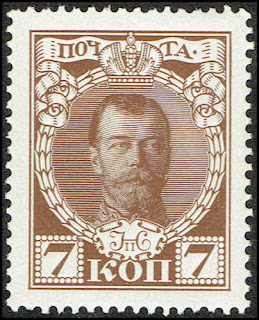1762 – Catherine II becomes tsar of Russia upon the murder of Peter III of Russia.
Catherine II (2 May [O.S. 21 April] 1729 – 17 November [O.S. 6 November] 1796), also known as Catherine the Great (Екатери́на Вели́кая, Yekaterina Velikaya), born Princess Sophie of Anhalt-Zerbst, was Empress of Russia from 1762 until 1796, the country's longest-ruling female leader. She came to power following a coup d'état that she organised—resulting in her husband, Peter III, being overthrown. Under her reign, Russia was revitalised; it grew larger and stronger and was recognised as one of the great powers of Europe
Stamps from Russia depicting Catherine the Great
1918 – Tsar Nicholas II of Russia and his immediate family and retainers are executed by Bolshevik Chekists at the Ipatiev House in Yekaterinburg, Russia.
In the early hours of 17 July 1918, the royal family was awakened around 2:00 am, got dressed, and were led down into a half-basement room at the back of the Ipatiev house. The pretext for this move was the family's safety, i.e. that anti-Bolshevik forces were approaching Yekaterinburg, and the house might be fired upon
Nicholas was carrying his son. When the family arrived in the basement, the former empress complained that there were no chairs for them to sit on. Yurovsky ordered two chairs brought in, and when the empress and the heir were seated, the executioners filed into the room. Yurovsky announced to them that the Ural Soviet of Workers' Deputies had decided to execute them. A stunned Nicholas asked, "What? What?" and turned toward his family. Yurovsky quickly repeated the order and Nicholas said, according to Peter Ermakov, "You know not what you do."
The executioners drew handguns and began shooting; Nicholas was the first to die
Some Russian stamps depicting Tsar Nicholas II
1936 – Spanish Civil War: An Armed Forces rebellion against the recently elected leftist Popular Front government of Spain starts the civil war.
The Spanish Civil War (Spanish: Guerra Civil Española) took place from 1936 to 1939. Republicans loyal to the elected, left-leaning Second Spanish Republic, in alliance with the Anarchists and Communists, fought against a revolt by the Nationalists, an alliance of Falangists, Monarchists, Carlists, conservatives and Catholics, led by a military clique among whom General Francisco Franco soon achieved a preponderant role. Due to the international political climate at the time, the war had many facets, and different views saw it as class struggle, a war of religion, a struggle between dictatorship and republican democracy, between revolution and counterrevolution, between fascism and communism. It has been frequently called the "dress rehearsal" for World War II.
The Nationalists won the war, which ended in early 1939, and ruled Spain until Franco's death in November 1975.
Some Spanish Civil War stamps









No comments:
Post a Comment